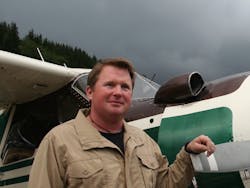Clayton W. Eveland
Age: 38
Captain/Director of Maintenance
Pacific Northwest National Laboratory
- Alma Mater: Spartan School of Aeronautics; BS Embry-Riddle Astronautical University
- Something that people may not know about me: Two years after I saw my first Twin Beech I was flying them
- Favorite book: Fate is the Hunter
- Favorite TV show: None
- Favorite movie: Indiana Jones Movies
- Favorite hobby(s): Aircraft restoration
Clayton Eveland didn’t start off college with a focus on aviation. But, when he found passion for it, he found himself piloting passengers around Hawaii and working as a bush pilot in Alaska.
“Somedays it would seem like you were the very first person to ever see that landscape or explore that coastline,” he said. “Now obviously you’re probably not, but it makes you wonder what it must’ve been like for the sailor’s way back when the maps weren’t even being made yet when they started charting the world.”
Eveland is director of maintenance for Battelle/Pacific Northwest National Laboratory. He maintains a G-159 (Gulfstream I) for the U.S. Department of Energy’s Atmospheric Radiation Measurement (ARM) program. The aircraft is highly modified to accommodate up to 40 scientific instruments, both internally and externally mounted.
Eveland maintains the aircraft IAW the Gulfstream CMP program and works long and hard to ensure everything is compliant with the regulations. He has made modifications to the aircraft to support scientific instrumentation both internally and externally. This has involved external pylons, window mounts, and belly mounts.
He uses exiting structure when able and manufacturers what is needed. All of the instruments are removed after each campaign and a new set is installed and tested as dictated by the science.
He has upgraded the exiting power in the aircraft from the original 600 amps to 1,200 amps. All of the instrumentation generates an enormous amount of heat. Eveland has re-worked the air cycle machine and an additional Freon air conditioner.
In addition to this, he has engineered self-contained, window mounted, heat exchangers. The average temperature in the cabin has dropped nearly 20 degrees due to his efforts.
Eveland has worked on maintenance and instrument issues in very remote parts of the world, including the Amazon rainforests and the North Slope of Alaska in just the past year. He and his crew have maintained greater than a 99 percent dispatch rate for more than two years. On top of all of his maintenance duties, Eveland is a type rated Captain in the G-I. He is an accomplished pilot with well over 5,000 hours.




